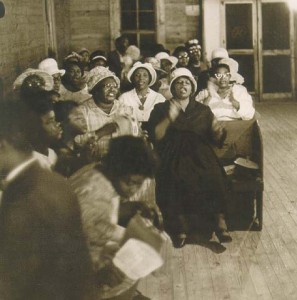From Zora Neale Hurston’s The Sanctified Church:
High John de Conquer came to be a man, and a mighty man at that. But he was not a natural man in the beginning. First off, he was a whisper, a will to hope, a wish to find something worthy of laughter and song. Then the whisper put on flesh. His footsteps sounded across the world in a low but musical rhythm as if the world he walked on was a singing-drum. Black people had an irresistible impulse to laugh. High John the Conquer was a man in full, and had come to live and work on the plantations, and all of the slave folks knew him in the flesh.
The sign of his man was a laugh, and his singing-symbol was a drum. No parading drum-shout like soldiers out for show. It did not call to the feet of those who were fixed to hear it. It was an inside thing to live by. It was sure to be heard when and where the work was hardest, and the lot the most cruel. It helped the slaves endure. They knew that something better was coming. So they laughed in the face of things and sang, “I’m so glad! Trouble don’t last always.” And the white people who heard them were struck dumb that they could laugh. In an outside way, this was Old Massa’s fun, so what was Old Cuffy laughing for?
Old Massa couldn’t know, of course, but High John de Conquer was there walking his plantation like a natural man.
You never know how or when the threads of your lives intertwine. I have written three books in recent years and, upon reflection, I see that they are inter-related: People Get Ready: A New History of Black Gospel Music, Reluctant Prophets and Clueless Disciples: Understanding the Bible by Telling Its Stories, and Jesus Laughed: The Redemptive Power of Humor. And now that I’ve begun work on Nothing But Love in God’s Water: The Influence of Black Sacred Music on the Civil Rights Movement, I see where they all connect. They’ve all helped prepare me for this moment.
I wrote Jesus Laughed in part because of the visits Mary and I had made to black churches in the course of writing People Get Ready. Black churches resound with laughter before, during, and after the services in a way that the white churches I’ve attended do not. Where did we lose that capacity to laugh?
I’m writing Nothing But Love in God’s Water in part because of the ways black sacred song — from the spirituals through the union movements through the Civil Rights movement — has continued to irrepressibly bubble up and envelope black people at their times of greatest need … as if this music is always there, always available, always waiting for a moment like this.
And now I stumble across Zora Neale Hurston’s essay on High John de Conquer, a mythic black figure who pre-dates John Henry and Stagger (or Stack-o) Lee. High John’s weapons are laughter and song. And speed. High John is fast, as Hurston writes:
Maybe he was in Texas when the lash fell on a slave in Alabama, but before the blood was dry on the back, he was there. A faint pulsing of a drum like a goat-skin stretched over a heart, that came nearer and closer, then sombody in the saddened quarters would feel like laughing and say, “Now High John de Conquer, Old Mass couldn’t get the best of him. That old John was a case!” Then everybody began to smile.
It’s about story — a story that came from Africa that sustained the slaves and their descendents for generations. It’s about song — songs that came from Africa and enveloped the best of the Christian faith and withstood the dogs and water cannons in Birmingham. It’s about laughter — laughter that came from Africa and enabled blacks in the Jim Crow south to laugh secretly at those who spent most of their waking moments trying to figure out ways to crush High John and the millions like him.
It is no accident, Hurston writes, that High John de Conquer has evaded the ears of white people. They were not supposed to know. You can’t know what folks won’t tell you.
And so it is with Nothing But Love in God’s Water. I’m teasing out from the songs and singers HOW this music helped them get over. WHAT this music provided that enabled them to challenge the most powerful nation on the planet armed only with love and justice. It’s all there in those on spirituals and those unstoppable gospel songs — the stories, the laughter, the music. The trouble is, of course, is that I’m seeing (and hearing) through a glass darkly.
And armed this knowledge, once again, I pray for strength every day to do that song, that laughter, that story justice.
